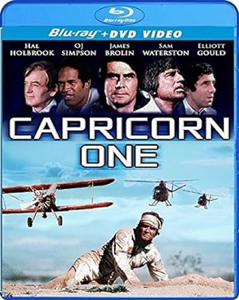Earlier this year, Hollywood put out “Fly Me to the Moon,” an alternate-history tale about a faked moon landing during the Apollo program. But cinema has been telling these tales for a long time, including in “Capricorn One” (1977), which came out five years after the last (for now) moon landing.
In one of writer-director Peter Hyams’ many space-related films – the best of which, in my opinion, is the underrated “2010” (1984) – he imagines that a mission to Mars (oddly, taking place around the film’s present day) has to be secretly scrapped. But to keep NASA funded, the movers-and-shakers fake the mission.
I watched “Capricorn One” never quite knowing if it is a bone-dry comedy or a dead-serious drama, but that’s OK, because it is both. As someone who believes the moon missions happened, but who also believes the government has enough power and reach to successfully achieve significant cover-ups, I can see how the movie would appeal to the confirmation bias of both conspiracy theorists and debunkers.

“Capricorn One” (1977)
Director: Peter Hyams
Writer: Peter Hyams
Stars: Elliott Gould, James Brolin, Brenda Vaccaro
The drama-comedy blend is a strength here, because – unlike the bizarro-romp “Don’t Look Up” (2021) – it’s not herky-jerky in tone. Though propulsive in its forward plotting, it’s a mostly sober thought experiment about how a grand fake-job could be pulled off – and some ways it might go wrong, yet still recover its aims. Yet Jerry Goldsmith’s light, fun score keeps us from taking it too seriously.
Cover-ups haven’t changed much
Much like when we watch documentaries about the Apollo missions, “Capricorn One” is dated in the sense that the technology is old, but it doesn’t feel dated in the ways that matter. A 1970s cover-up isn’t all that different from 2020s obfuscation schemes.
Particularly timeless is middle-management’s gaslighting of NASA console worker Whitter (Robert Walden). He notices the video transmissions are coming from Earth, not from Mars, and tells various supervisors. They gaslight him about the faulty Console 36, but when he doesn’t take the hint to set his professionalism aside and toe the company line, he is “disappeared.”
The segment where investigative TV journalist and Whitter’s friend Robert Caulfield (Elliot Gould) finds Whitter has been erased from the face of the Earth could be read as dark comedy. Does the government have a handy stable of people ready to move in to the apartments of disappeared people and claim they’ve been there for a year? Or it could be read as chilling, but I have to acknowledge “Capricorn One” isn’t exactly “The Parallax View” in that regard.

(Interestingly, while the modern proliferation of data and record-keeping about citizens’ activities is generally not good for privacy, it would also make it difficult, or at least very time-consuming, to disappear someone. There would be so many records to change.)
Despite its tonal blend, Hyams does craft an effective suspenser and thriller. Viewers who go in blind will especially enjoy the early steps of the cover-up, as the three astronauts (James Brolin, Sam Waterston and O.J. Simpson) are pulled from the capsule and moved to a soundstage on an abandoned military base. (A sign tells us it closed in 1947, not coincidentally the year of the Roswell incident.)
Film stays at full throttle
After that step succeeds, “Capricorn One” is in danger of losing its thrust, but Hyams keeps the throttle up. Brubaker (Brolin) seems to give a coded hint to his wife (the uniquely voiced Brenda Vaccaro) in one of the transmissions “from Mars.” This sparks Caulfield’s probe. I would’ve liked the investigative aspect to be more complex. For instance, it might’ve been neat if someone had noticed the shadows on the Mars “skyline” or the studio lights in the astronauts’ facemasks.
A more action-oriented type of suspense springs from the astronauts’ attempt to escape into the desert, and it culminates with an intense sequence featuring a crop duster taking on two military helicopters. Maybe it was overshadowed by “Star Wars” that year, but as something much-less viewed, the thrills remain.
“Capricorn One’s” ethical questions have been backgrounded by that point, but they percolate. Why would anyone go along with this hoax? Threats to their family. And if the astronauts try to get the word out (ironically, by getting seen by the media – the same thing that makes the front-and-center hoax play well), they’ll be tracked down.
Those issues are addressed from the perspective of our three American heroes. And somewhat from that of the string-puller (ironically played by Hal Holbrook, the whistleblower in “All the President’s Men” from one year prior).
But we don’t know why, for example, the helicopter pilots or that lady who takes over Whitter’s apartment are willing to participate in this cover-up. Just following orders? The path of least resistance? Cold hard cash? As soon as a viewer starts to think about the sheer number of side characters needed to achieve a cover-up, “Capricorn One” gets very dark indeed, and not in a comedic way.

